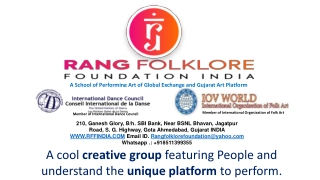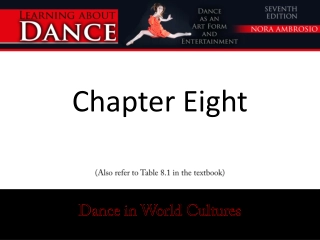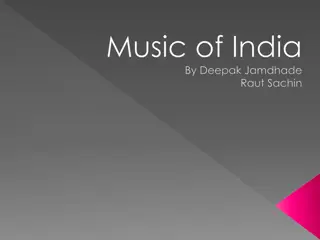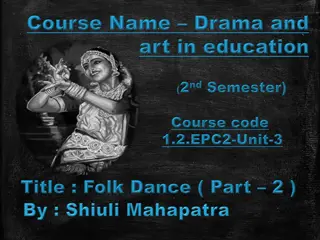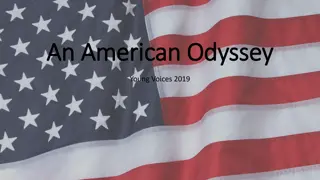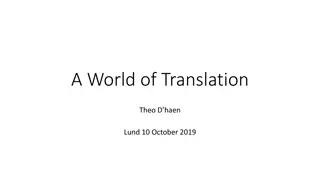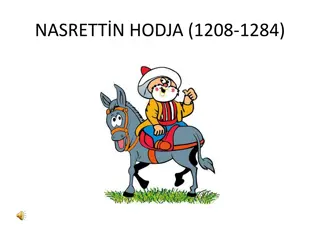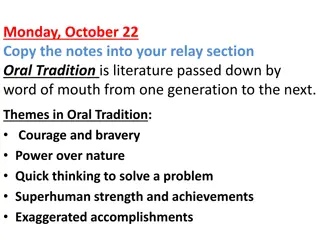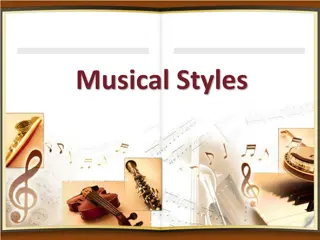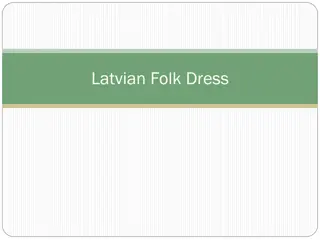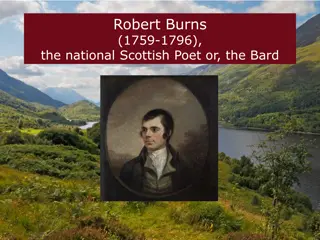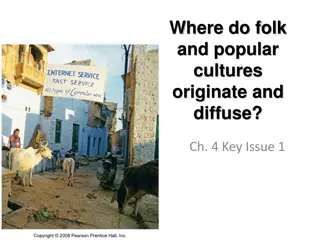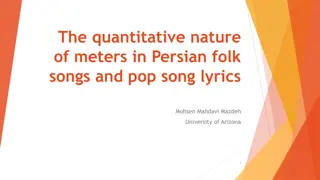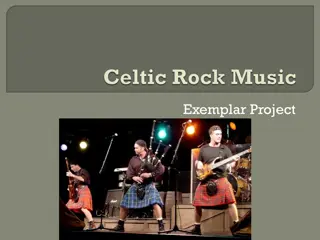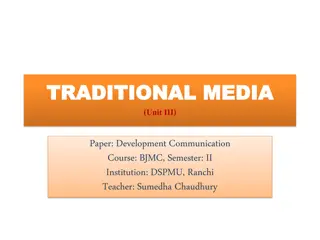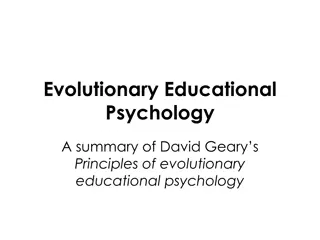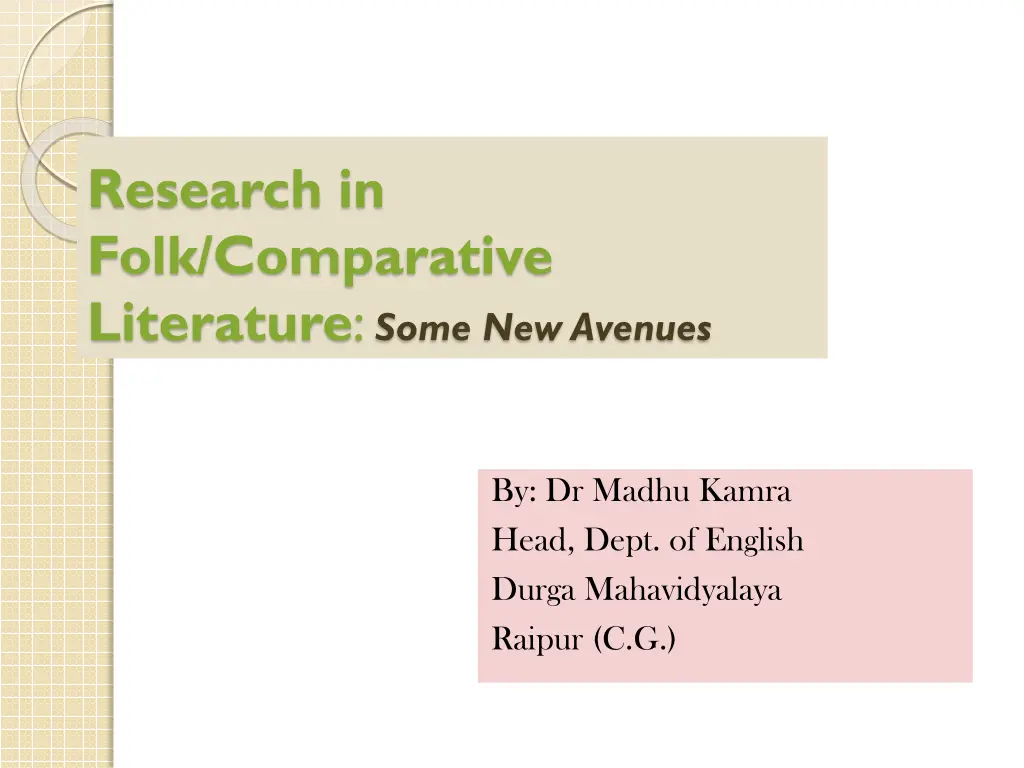
Exploring New Avenues in Comparative Literature Research
Dive into the world of Comparative Literature research with Dr. Madhu Kamra as she discusses the importance of research justification, the definition of Comparative Literature by various scholars, and the significance of this field in understanding diverse literary traditions. Discover why Comparative Literature is a distinct discipline and explore enriching literary treasures from different cultures.
Uploaded on | 2 Views
Download Presentation

Please find below an Image/Link to download the presentation.
The content on the website is provided AS IS for your information and personal use only. It may not be sold, licensed, or shared on other websites without obtaining consent from the author. If you encounter any issues during the download, it is possible that the publisher has removed the file from their server.
You are allowed to download the files provided on this website for personal or commercial use, subject to the condition that they are used lawfully. All files are the property of their respective owners.
The content on the website is provided AS IS for your information and personal use only. It may not be sold, licensed, or shared on other websites without obtaining consent from the author.
E N D
Presentation Transcript
Research in Folk/Comparative Literature: Some New Avenues By: Dr Madhu Kamra Head, Dept. of English Durga Mahavidyalaya Raipur (C.G.)
Research is re search Newness in exploration literary gaps scholastic established Finally Newness themes fillings purposes perspectives for your (newness in professional contextual development implication)
Be Aware of Research Justification or Research Rationale Why you are researching? Or Doing research for what reasons Research significance how this research is going to affect or effect- What is already established
Comparative Literature defined Claudio Guill n in the book The Challenges of Comparative Literature (1993) Comparative literature is not a new label and is usually understood as supranational assemblages. Susan Bassnett in Comparative Literature:A Critical Introduction- Comparative Literature as a discipline has had its day in 1993, a network of scholarly discourse has situated Comparative Literature at its centre. Thus, in the twenty-first century, it is imperative, if I may say so, to understand why Comparative Literature has always been in the midst of such political activity when studied across the coordinates of space and time.
Comparative Literature defined Welleck andWaven Comparative Literature is the study of relationships between two or more languages.It isWorld Literature.
Why comparative Literature DrAmiya Dev in his essay Towards comparative Indian Literature says that there is no Indian literature there can be only Indian literatures Tagore was perhaps the first one to conceive the idea of Visva Sahitya . Radha Krishnan emphasised Indian Literature as a unified concept in his statement for Indian literature is one though written in many languages. Swagata Bhattacharya- comparative Literature in India developed as a neutral phenomenon, something which was bound to happen . Comparative Literature is now a Distinct Discipline,its nomenclature and legitimacy is much recognized.
Riches in Treasures HarishTrivedi The Urdu Premchand:The Hindi Prem Chand Dr O.P Juneja Domesticated English:The Language ofAfrcian and Indian Fiction Epsita Halder- From Mourning to Marytrology:Karbala Narratives in Late 19th 20thCentury Bengal
Demand of Comparative Literature Dr.O.P Juneja announces The Indians have not been able to interiorize and domesticate English to a great extent. The flavour of local langauges do exist but African counterpart is more exemplary and nuance savory. Need to bridge the Schims between urban,rural and tribal langauges. To provide readability and shelf life to books written in declining or minor languages. Language need to be contrasted to a widely used or vigorous one.
Demand of Comparative Literature To showcase that remote themes for our massive research dependence. To recognize unidentified or lesser writers not because of content but thin readership as the new organizing centre.
SapirWhorf emphasise the demand as No two languages are ever sufficiently similar to be considered as representing the same social reality. The worlds in which different societies live are distinct worlds,not merely the same world with different labels attached. (culture language and personality 1956)
In simple terms Comparative literature focuses on two literary texts compared Texts could be of similar or dissimilar areas/forms/Trends Compares literary texts in more than one language whereby recognises the qualities of a text more extensively. Uses investigation of Contrasts Analogy Influence communication
Profits of Comparative Literature Overcomes the division between theWest and the Rest Traces the transformation and changes of literary genre and texts across time and space. Introduces students to the global diversity and literary forms. Its flexibility
Field of Studies French School Literary schools and genres Ideological Echoes Image echoes Verbal echoes Human models and heroes
American School Labels as Universal Cosmopolitanism Mainly two fields of study Parallelism Intertextuality
Russian School Russian School is as E.G.Napokoeva called it narrow formalism It is closely related with social and historic background
Defeating Complications Comparative literature produces only and only a semantic dilemma. Because it studies first the basic meaning of a text and then the relational meaning, hence the sway of meaning becomes lopsided. According toToshiko Izutsu Relational side of a word meaning requires a minute and careful investigation into the general cultural situation of the age and the people For, after all, what we call the relational meaning is nothing other than the concrete manifestation,or crystallization of the spirit of the culture (Izutsu,1964)
Folk in Myriad names Gramya Pinda de Lok Katha Katha bol (Gujarat) (Bengal) (Punjabi)
Our Icons believe Socrates- The role of the rhetorician is to produce conviction on the soul. Sartre in Nausea (1938) writes How could I have written that pompous, absurd sentence yesterday. I was alone but I marched like a regiment descending on a city I do not need to make phrases. I write to bring certain circumstances to light. Beware of literature.
Topics Academic status of Punjabi folklore Domesticated English in the Punjabi folk songs Does European Benevolence exist in A Passage to India? Exploration in asymmetrical short stories Food for thought: The Dynamics of community and culinary Essays in Indian History: Towards a Marxist perception Comparative Literature is required to add more than are signifier in Narrative discourse we are more than capital growth signifiers
Why Research in Folk Misconceptually embodies only cultural specifities. Folk does not exist in separation Locate newer rendition in Folk specifically language Explore oral commonly the domain for culture Very important each oral rendition is distinct Meaning making and meaning production shares same temporal slot (Transmission mode)
Features of Some Nautcha Songs The Nautcha songs are also called Nachouri songs. These songs are solo and in question answer form. Varied on theme and situation of the play. Some songs become popular have their poetic and lyrical qualities.
Womens Plight , - O Sister! My husband has gone to other country No body comes, nobody goes (there) Neither sends any message My husband has gone to other country For whome shall I apply henna For whome shall I comb my hair For whome shall I cook rice and pulse My husband is in a distant country Without him I do not like The place of my in-laws My husband has gone to other country
Marital Plight Four women are going to bring water All of them are beautiful They are talking about their plight One woman says listen o sisters! My husband has gone to a distinct country Neither anybody comes nor goes (there) Nor he is sending any message Another woman says listen o sisters! My husband drinks liquor. He squanders all the money in one day Which he earn in twelve months. Another women says listen o sisters! My husband smokes canabis sativa (ganja) He goes out for one hour but returns after ten hours Another woman says listen o sisters! My husband consumes opium He grinds two tolas of opium leaves And consumes atonce. Four women have gone to bring water Telling their plight to each other
Green Cultural Studies , , , , , - , , , Tari nari na more naha nari nana, jara sunto (Prop) Listen O my neighbour your child is weeping Just listen! Oh on the dry tank a heron is flying Just listen! Flowers blooming in the tank. I have plucked a lot of flowers full of my sarie s end (Palla) I have tucked so many flowers in my hair bun. My husband laughs at me and asked, just listen From where did you get all these flowers? In my childhood I made a friend I got all these flowers from him just listen.
Books to read Research Methods for English Studies Gabriele Griffin 2013 contains 12 long chapters with one an Oral History by (Penny Summerfield). Sylvian Levi. The Theatre of India. Vol. II (translated from the French by Narayan Mukherjee, 1978)

